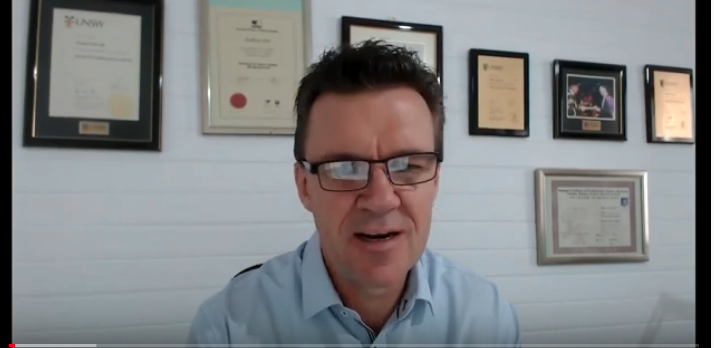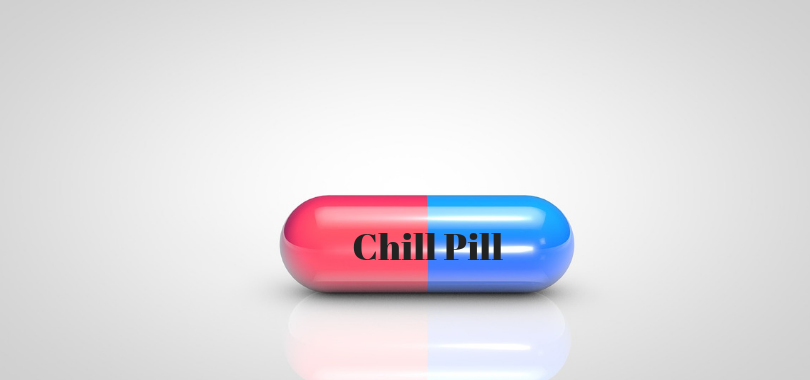Previously I have mentioned that I was going to talk to you all about a special medicine and a special kind of pill, that can not only help you with gynaecological and other healthy issues, but it can also help with fertility and being able to fall pregnant.
I was going to post this up straight away, but then I had to think more about it, because I know when you mention this subject, people can take a message with the intention of helping the wrong way.
So what is this special pill that I am talking about and not yet available on the market?
Well, it’s called a “Chill Pill” and many of us need to be taking it often, or learning to administer it often.
Now, before anyone gets all up in arms about this and what I am about to say, I need you to listen and take the personal out of this and just hear the reasons why.
I have been on the other end of stress, where it almost killed me, literally and I know how it then affected my health and then exacerbated pre-existing health complaints I had. So I am coming from a place of understanding, but also a place of wanting to help people through my own experienced personally, but also what I see in clinical practice daily. I was one of those people who kept saying that weren’t stressed, or that I don’t feel stressed, yet all the while my body signs were saying something different.
Like any change we need to make, the first part is admitting there may be something wrong in order to enact that change.
The sad fact is that 9 out of 10 people report being stressed and 41% of people feel they experience unhealthy levels of stress. Stress and the body’s response to it, can affect people in different ways. Small amounts of stress that are easily resolved can help to keep us motivated and achieve our goals.
The difference with long term or chronic stress is that it can affect the whole body in a negative way. It is the long grade, low grade stress (or busyness) that often creeps up on us and causes issues. Many people do not even know they are stressed, or that stress is a big factor in their current health issues, because they are either so used to it, or their health issues takes over and they cannot even begin to see the correlation.
The harsh reality of many problems in life is that we are ultimately responsible for our own well-being. Not all people will want to accept this, as it is so much easier to blame someone or something else for our dilemmas.
Nearly every problem we experience in life may have an element of stress to it bought on by ourselves and our busy lives, with many of us not consciously knowing it is at play. That means everything from a common cold to a long-standing illness. Everyone reading this will be by now squirming in his or her seats as the harsh reality of such a statement hits home. But the real problem with this is that it is true. I know I had to face this reality with my own health issues. We can and do cause many of our own health problems, or exacerbate them, either consciously, or subconsciously.
The problem with any health matter is getting people to become responsible for their own self. So much illness is completely preventable if we would just take responsibility for our own actions. It is so much easier to blame someone, or something else with comments such as “ I have tried everything”, “That didn’t work for me”, or “I’ve been everywhere and nothing can help me”.
The problem with many of these blanket statements is that they are all just excuses not to take responsibility for our actions. Maybe it isn’t that the methods you are trying aren’t working. Maybe it is simply a matter of nothing will ever work unless we make that all important change for ourselves first.
Sure, some disease states are hereditary, or someone have a predisposition for them, but even so, once the illness, or disease is expressed in the body, it is our responsibility to do what we can to control it.
Yes, sometimes it doesn’t seem fair, I get that, but sometimes you just have to admit there is an issue that isn’t going away in a hurry, or keeps being flared up, because you need to make some changes in your life to better manage this issue.
I know this is something I had to learn myself. Boy did I fight the reality of this in the beginning too. But, I also acknowledge that some people have seen some pretty shitty healthcare practitioners who have missed and dismissed their issues too. It all compounds and just makes everything seem so much worse. But, at the end of the day you can also find good practitioners who can help you too.
Stress is also a major factor in many couples not being able to conceive. Stress affects cortisol levels and the adrenals and this then has an effect on testicular and ovarian function.
Stress can affect both sperm and egg quality and high stress levels also affects our hormones and our immune system. Stress also has an effect on the uterine environment, which can affect implantation, affect circulation in the uterine lining, and also increase the risk of miscarriage. High stress levels also exacerbate, or fuel many gynaecological and men’s reproductive health issues too.
Looking for the ‘Off ’ Butt on
Stress can affect each of us differently. Perhaps you are suffering from anxiety, feeling worried, depressed or irritable; even feeling exhausted and overwhelmed can indicate you are under stress. As well as affecting your ability to cope, stress may also be causing a disruption to your health. When under stress for a length of time, you may be more susceptible to tension headaches, high blood pressure, frequent colds and flus, digestive disorders or a worsening of an existing condition.
So you can see, there are many reasons why it is so important to manage your stress now, take that “Chill Pill” before it starts impacting your health and wellbeing.
How Resilience Begins
Some people seem to deal with stress better than others. That doesn’t mean that the rest of us need to continue suffering. The ability to increase your resilience to stress is something that can be learned and helped with talking to a counsellor, or psychologist etc.
There are supplements, nutrients, and vitamins to support your body’s individual stress response system too. Many people are lacking key nutrients because of our highly processed diets now and we also know that gut health, and a healthy microbiome is integral to psychological wellbeing and our moods.
Taking a strain specific probiotic and a prebiotic daily can improve gut health and improve your immune system and psychological wellbeing. Omega 3 oils, multivitamins, melatonin, St John’s wort, passion flower, chamomile and many other herbs and nutrients can assist with coping with stress and its impact on the body.
Don’t buy vitamins or supplements off the shelf at the chemist or supermarket as these are so inferior and contain lots of fillers and additives that aren’t good for you. Always see a qualified healthcare practitioner to get proper advice on what nutrients and supplements are needed for your health complaint.
By the way, Dr Google is banned in my clinic. Dr Google is not a reliable way to find out about healthcare products and illnesses. Only a trained healthcare professional should be giving you that advice. But, in saying that, researching where to find a good practitioner is great and also developing and understanding of ones health issues is great too, as long as it doesn’t become an obsession and that is all you focus on. It is about a balance. There is nothing wrong with trying to be informed. But, trying to self diagnose, or self prescribe is not a good thing at all.
Some people may be in such a bad state that medication may be needed to get them over their first hurdles and develop some resilience and coping skills. This should always be done in conjunction with talk therapy as well. To be honest, most of us could do with talking to a good counsellor or psychologist to get some coping strategies to deal with work, business, health, or life better.
Lifestyle Tips to Help Manage Stress
Managing your stress is essential for long-term health and vitality. With proper support, a variety of stress relief techniques can be introduced, in conjunction with a
healthy eating plan to help assist you in stressing less. These may include:
- Exercise: Daily movement is essential for brain health. Aerobic exercise including running, swimming or walking is proven to decrease stress hormones. Resistance exercise is also great for stress relief, burning fats, increasing lean muscle and keeping you healthy.
- Enjoy the benefits of spending some time in the sun. Being in nature for 30 minutes per day can help reduce stress hormones and assist recovery after a stressful situation.
- Meditation and/or yoga can help to increase relaxation whilst benefiting not just the mind, but also the body. Learning to unwind is important for reducing stress.
- Favourite pastime: create time for YOU! Do something that you love, like listening to music, enjoying a candle lit bath, watching a movie, or starting a creative project – these fun activities can help you become more tolerant of everyday stress.
- Get creative and express yourself in as many different ways as feels good; singing, dancing, and art projects are but a few ways to do this.
- Eat seasonally, fresh and organic as much as possible. Include protein at every meal with a variety of fruit and vegetables.
- Include good fats such as omega 3s from fish, nuts and seeds, and olive oil to help with brain health and mood regulation.
- Drink plenty of water, a minimum of eight glasses per day and avoid excessive alcohol, caffeine, sugar and salt.
- See a counsellor, or psychologist to get some coping strategies in place.
- Acupuncture has been shown to be as effective as medications for stress and equal to the effects of talk therapy in several major studies.
Stress Less for Good Health
Our modern lifestyle is inescapable. The stress of it however, is manageable. This is why I mentioned the magic “Chill Pill”. All people have to do is take the advice and administer it often.
You aren’t born stressed and being stress isn’t a part of you. It is a learnt behaviour that can be changed. You can become more resilient to the symptoms and long term effects of stress through the aid of individualised lifestyle and dietary changes, together with nutrients, supplement and in some cases medicines that your healthcare providers can help you with.
Talk therapy such as counselling and psychology is an integral part of leaning to cope with stress and dealing with it better too. Mindfulness and meditation can also assist with stress.
Supporting a healthy stress response will allow you to feel more energised, resilient and ready to tackle life, so you can maintain the state of health and wellness that you deserve.
I hope that helps everyone and please remember to take off those superwoman/superman capes regularly, allow space to just breath and shut off the mind and just have some you time. It is OK to just sit there and not feel guilty about it. People need to learn to switch off the “busyness” and close down the 100 boxes they have open. It is Ok just to sit in peace and quietness and not feel guilty about it. Actually, your body needs to do this to maintain your inner health, but also your psychological health.
Every persons health, or disease state is different and while stress may not be the cause of ones particular issue, it can certainly exacerbate it. This is why it is so important to look at every aspect of ones life, not just a small isolated portion of it.
When was the last time you allowed yourself the space to just be, just take some quite time and let the world pass by for a little while without worrying about it?
Take care and relax and don’t work too hard. We work to live, not live to work.
Regards
Andrew Orr
-No Stone Left Unturned
-Women’s and Men’s Health Advocate


